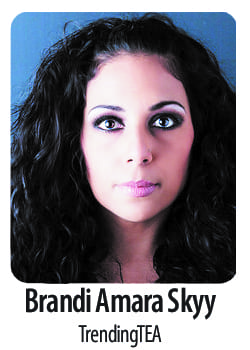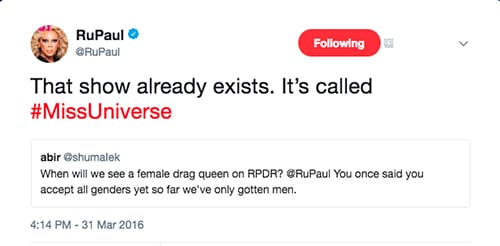 Recently, the drag and LGBTQ communities were shaken by an interview RuPaul did with The Guardian. In it, Ru basically devalues and dismisses all forms of drag other than his own — a cis-man transforming into “woman.”
Recently, the drag and LGBTQ communities were shaken by an interview RuPaul did with The Guardian. In it, Ru basically devalues and dismisses all forms of drag other than his own — a cis-man transforming into “woman.”I get it. That’s still what a lot of people think drag is. And by people, I mean drag traditionalists and the new mainstream audiences that RuPaul’s Drag Race is serving. And by serving I mean as in the show’s target audience.
I once got into a discussion about Will and Grace with a colleague (yes, it is now a WELL-KNOWN fact that I have not nor do I want to watch an episode of the show), and they said something in their argument that has stuck with me forever: “Will and Grace isn’t for us. It’s to humanize and familiarize us with mainstream audiences so they can understand and empathize with us and our cause.”
And I think the same holds true for RuPaul’s Drag Race. Because like Will and Grace, RPDR isn’t necessarily for us either. And by us, I mean the individuals who live and breath drag every day, who want (and do) make art of our bodies, our gender and our lives by completely subverting and erasing every status quo belief about all of the above.
Sure RPDR highlights what we do as drag artists, but it in no way defines it. RuPaul’s Drag Race is to drag what Keeping Up With the Kardashians is to reality — not real everyday life, but a slice of it that has been polished up and scripted, a highly-edited version of what life and life in drag is like.
And RuPaul has become the Caitlyn Jenner of drag. But hey that’s just the nature of television right? And while lack of representation of ALL of drag is an issue, it’s not the real problem.

The real problem is that we keep having these same conversations and arguments with the same people. In real life, if we kept telling a friend and mentor how what they are saying (and continue to say) hurt us and devalues our experiences and they don’t listen, we’d probably remove ourselves from the relationship.
But that’s exactly what RuPaul is doing.
And yet, here we are (again) with RuPaul and the kind of dismissive rhetoric we would expect to come out of the mouths of Trump, Pence, Ted Cruz or any other right-winger — not from one of our own.
And I’m going to need Ru to do better. Way better.
Because alongside RuPaul’s tweet about the Olympics was an open invitation granting the rest of the world permission to treat and talk about us like that,
 too. Or as Eddie Broadway, Mister USofA MI 2017 put it, “When a young transgender kiddo is alone in their room looking for some affirmation, they have social media, TV, etc. They can see that even Ru is transphobic. The heterosexual community can see that ‘oh.. even gay men hate transgender people.’ When someone with this influence shows the rest of society that it is okay to say hurtful things towards the transgender community, it makes it okay for the rest of the community to jump on that train.”
too. Or as Eddie Broadway, Mister USofA MI 2017 put it, “When a young transgender kiddo is alone in their room looking for some affirmation, they have social media, TV, etc. They can see that even Ru is transphobic. The heterosexual community can see that ‘oh.. even gay men hate transgender people.’ When someone with this influence shows the rest of society that it is okay to say hurtful things towards the transgender community, it makes it okay for the rest of the community to jump on that train.”And the hate is real for those members in the drag and trans community who speak out and against pop-culture’s anointed gay icon.
In her response to the most recent RuPaul comments, Monica Beverly Hillz, who appeared in season 5 of RuPaul’s Drag Race, shared a story about how the first trans woman she knew in her city was killed “for just being brave enough to live her authentic self.” She says, “When I shared that I didn’t agree with the term ‘shemale’ and felt it was transphobic, I received emails and messages from fans telling me I was ‘ghetto’ or ‘ungrateful’ or calling me racist names, unfriending me, even sending me death threats.”
And PEOPLE, this is NOT the community of inclusivity and diversity, that you, I, Harvey Milk, Marsha P. Johnson, Augie Flanigan, Brenda Howard, Essex Hemphill fought (and continue to fight) for.
It’s the anthesis.
And I’m going to need for us to do better too. Way better.
We have GOT to stop attacking one another for speaking our own truth and expressing our own feelings and thoughts. Yes, deep listening and disagreeing can co-exist together. It’s called love.
We have to stop accepting half-ass apologizes that do nothing for our community except to temporarily subdue our anger, and then when anti-gay laws, online and off-line bullying happen to our LGBTQ youth and us, we wonder why the rest of world hasn’t changed.
We have to challenge ourselves just as much to learn more about the evolution of our own community.
As an AFAB (assigned female at birth) drag queen for 13 years, there are still huge portions of the LGBTQ and drag community who don’t understand what it is exactly that I do and how what I do is drag. And there are many of us in the art who are trying to change that. It’s a bit harder when the so-called voice of drag publicly compares the art of what you do to the Miss Universe Pageant.
 But it was also around the time of that tweet that I stopped taking offense to what RuPaul has to say about me and my art because I, we, and the rest of the female drag community are what he once was. In Chapter 9 of his book, Letting It All Hang Out, RuPaul says of the drag he and others did at the Pyramid club in New York, “the new drag, or superdrag as I like to call it, came out of punk and parodied all that was held dear in our society” [emphasis mine].
But it was also around the time of that tweet that I stopped taking offense to what RuPaul has to say about me and my art because I, we, and the rest of the female drag community are what he once was. In Chapter 9 of his book, Letting It All Hang Out, RuPaul says of the drag he and others did at the Pyramid club in New York, “the new drag, or superdrag as I like to call it, came out of punk and parodied all that was held dear in our society” [emphasis mine].Now the “dear” is him and his show, and we are the revolution. We are the future of drag, just like at some point in our his/herstory timeline, he was too.
Yes, I’ve got mad respect for what RuPaul has built and the doors he as opened as far as the accessibility of drag to those who don’t live in safe cities and spaces. But I don’t owe him anything.
He didn’t pave the way for me to win the very first national drag pageant for cis/ AFAB women, Miss USofA Diva in 2014. He didn’t lighten the burden or the cackles from people in my own community when I took the stage proclaiming I was a drag queen. He didn’t open any doors for me in drag — he’s closed them.
But I ripped those bitches off their hinges. And so did other fearless women — Fauxnique, Carmelita Tropicana, Ana Matronic.
The real tea? Did RuPaul’s rise to mainstream fame help? Absolutely. But he alone is not the cause. He alone is not the reason that drag is such a revered and now celebrated queer art.
That was us. ALL — Kings, Queens, Hyper, Genderfuckers, Club Kids, Bearded, non-binary — of us.
Every time we graced a stage that someone told us we couldn’t. Every time we performed our rhinestone heart out on life’s runway as the same mainstream audiences that now worship our queer art whispered, pointed and laughed.
Every time we laced up our Kinky Boots to slay the stage, we showed the world just how Divine and diverse we really are.
And THAT’s the truth, the realiTEA of drag.
Brandi Amara Skyy is a writer, drag artists, and host of The Drag Show Podcast. Listen to Episode 01: You Are Born Naked and the Rest is Drag … RIGHT?!? here.

